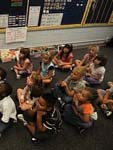







Introduction What About Freire? The Pink Monkey Psst! Wanna Buy A...? And His Pants Are Ugly Conclusions Opinions References and Credits |
Chapter
2, “To Read or Not to Read: Online Literacy Interfaces and
PinkMonkey.com,” addresses one site in which students maintain their
own scholarly conversations—or, at least, their own conversations about
what they’re reading in school. PinkMonkey.com—though
it looks, at first visit, like a place for students simply to get study
guides and crib notes of the Sparks/CliffsNotes variety—also provides a
discussion forum for students to share observations and ideas about the
texts they’re reading in class, and to do so free of teacher
supervision. This discussion forum, according to Ritter, is the
most heavily used portion of the PinkMonkey website, and the most
suggestive for what we can learn about the kind of student “underlife”
enabled by internet technology. As Ritter suggests, the online conversations students have about literature once the teacher has left the building, and which are exemplified on PinkMonkey.com, are quite different from those they have with the teacher present. For Ritter’s purposes, the most significant aspect of these conversations is that no teacher ever steps in to resolve them—or, to put it another way, to shut them down—with the “correct” answer. Ritter asserts, following Kirstie Fleckenstein, that in cyberspace ethos is established differently than it is in a classroom: according to Fleckenstein, while in a classroom a teacher is “a solitary displaced actor” who can “dictate” what is correct and incorrect, online ethos “evolves on the basis of the flow of information, enabling rhetor, audience, place and language to create each other mutually through the establishment of relationships called prudence, virtue, and good will…” (as cited in Ritter, p. 60). In cyberspace, then, all interpretations are equally valid—or perhaps validity is not the point, because online the students “must commit the ‘ethos of performance’ that requires they momentarily judge the credibility of one another while employing their own good reasons and building their own virtual ethical identities” (p. 63). |